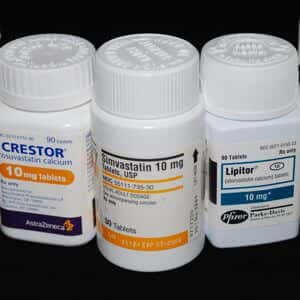
Statin enthusiasts have a hard time accepting that statin-type cholesterol-lowering drugs have side effects. There is even one clinical trial analysis from the UK that concluded “At the doses tested in these 83,880 patients, only a small minority of symptoms reported on statins are genuinely due to the statins: almost all reported symptoms occurred just as frequently when patients were administered placebo.” Many newspapers had headlines like: “Statins Have Virtually No Side-Effects, Study Finds” and “Statins have ‘fewer side effects than placebo’, suggests UK study.” What about neuropathy. Do statins cause nerve pain? It does not show up in the clinical trials.
Can Medications Cause Nerve Pain?
Q. I take a statin for high cholesterol. Over the years, I have developed neuropathy. I suspect the statins caused this problem. Is there any research that links neuropathy to statin use? I’d be grateful for whatever you can send me.
A. Nerve damage leading to pain (neuropathy) is controversial as a statin side effect. If you review the clinical trial data for popular statins like atorvastatin (Lipitor), rosuvastatin (Crestor) or simvastatin (Zocor) you would conclude that such statins do not cause nerve pain. At least there is nothing in the official prescribing information about this.
Dig a little deeper, however, and you will find in the FDA’s official monographs for such drugs under the category Postmarketing Experience:
“peripheral neuropathy”
There are no details. We have no idea how common neuropathic pain or peripheral neuropathy might be for patients taking statins.
Is There Any Research Suggesting Statins Cause Nerve Pain?
A review of less-recognized adverse effects of these cholesterol-lowering drugs notes that peripheral neuropathy has been reported (American Journal of Cardiovascular Drugs, 2008). The authors cite the Australian Adverse Drug Reaction Bulletin:
“Statin-associated peripheral neuropathy may persist for months or years after withdrawal of the statin…”
We are sending you our Guide to Cholesterol Control and Heart Health with a discussion of the pros and cons of statins as well as other approaches for promoting cardiovascular health. Anyone who would like a copy, please send $3 in check or money order with a long (no. 10) stamped (71 cents), self-addressed envelope:
- Graedons’ People’s Pharmacy, No. C-8
- P. O. Box 52027
- Durham, NC 27717-2027.
It can also be downloaded for $2 from the website: www.peoplespharmacy.com.
Chris wrote about his experience with atorvastatin:
“I was a healthy and vibrant 34-year-old critical care RN. After taking atorvastatin I became like a patient with Alzheimer’s disease. I was unable to walk or talk coherently. An MRI showed dozens of lesions in the gray and white mater of my brain. A brain biopsy revealed, autophagic vacuoles (holes). Mitochondrial DNA mutation most closely resembling MELAS (Mitochondrial Encephalomyopathy with Lactic Acidosis and Stroke-like episodes.
“Muscle biopsy revealed similar findings. I did not improve until I was evaluated by a visiting professor, who suggested a mitochondrial cocktail (essentially 12 vitamins, amino acids and 1 key component, Ubiquinol aka coQ10). I improved to the point I could go home with aggressive rehab therapies: physical, occupational and speech.
“I have been unable to work in any capacity since 11/02. Neuropsych evaluation revealed “significant cognitive impairments, of severity to limit any substantial gainful employment.” One month post discharge, I enrolled in the UCSD statin effects study, where it was determined that Lipitor was the causal contributor to the holes in my brain, the mitochondrial DNA mutations and the peripheral neuropathy.”
Do Statins Cause Nerve Pain?
Most clinicians would say no. There is virtually nothing in the clinical trial data about peripheral neuropathy. This complication comes on slowly. If researchers are not looking for it patients might not report it. We have no idea how common this side effect might be. All we have is the FDA’s acknowledgement that peripheral neuropathy has been reported as a postmarketing adverse reaction.
What’s your experience? Please share your story in the comment section below.


